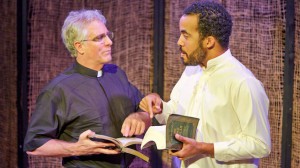“I am well aware of the irony that the artistic director of the Arabian Shakespeare Festival is a white man with the most Anglo name you could come up with.” That’s William J. Brown III, talking about his role as the founder of a small Bay Area arts organization whose mission is to bridge divisions between the United States and the Middle East through the power of theater. His last name, it seems, has been getting in the way. “I’ve been knocking on doors, as it were, trying to connect with the Arab community in San Francisco to start a dialogue,” he admits with a bit of a sigh. “I’m hoping it’ll be easier after this production.”
“This production” is A Message, a comedy by acclaimed Arab-Muslim playwright Dr. Hussain Al Musalam; the play runs November 7-17, 2013, at Royce Gallery in San Francisco. “Hussain Al Musalam is considered the godfather of artistic theater in Kuwait,” says Brown. “During the past couple of decades, there’s been a rise in what they call ‘the commercial theater,’ which of course there’s a place for, but Al Musalam is the one who really started bringing back theater for art’s sake, theater for the sake of a message.” And the overarching message of A Message, Brown says, is religious tolerance. “We selected this play because it deals with many of the same themes as William Shakespeare’s plays,” he adds.
To hear Brown describe it, A Message, which has been adapted for the American stage by Matthew Spangler (he also adapted The Kite Runner) and is directed by Christian Haines, sounds like the theatrical equivalent of that old joke about the Muslim, priest, Buddhist and atheist who walk into a bar, except in Al Musalam’s version, which is set in the near future, the group has crash-landed in Nigeria, where the U.S. has inserted itself into a messy civil war in the hopes of controlling yet another nation’s oil reserves. Naturally, the characters, whose faces will be familiar to Bay Area theatergoers (the cast includes Ray Renati, Laura Jane Bailey and Brown), must put aside their personal differences and exercise social and religious tolerance for each other in order to escape the war zone alive.

From left to right, Ray Renati, Anne Yumi Kobori, Laura Jane Bailey, and David E. Moore in A Message; photo by Gregg Le Blanc
On two occasions over the past few years, Brown and a handful of American actors ventured to the United Arab Emirates to bring the messages of social and religious tolerance at the heart of many of Shakespeare’s plays to the Arab world, or at least a corner of it. There they conducted workshops with university students, culminating in live performances, a practice for which there is little tradition in that part of the world. The first stop for the Arabian Shakespeare Festival in 2010 was the all-women campus at UAE University in Al Ain. After leading two weeks of workshops with women attending university there, Brown and two Bay Area actor-colleagues, Aldo Billingslea, who teaches theater at Santa Clara University, and Annamarie MacLeod, joined 13 female students to perform six scenes from five Shakespeare plays. “A lot of them wanted to play men,” Brown remembers, “and almost none of them wanted to speak in Arabic. We gave them that option, but for the most part, they wanted to experience Shakespeare in its original language.”



